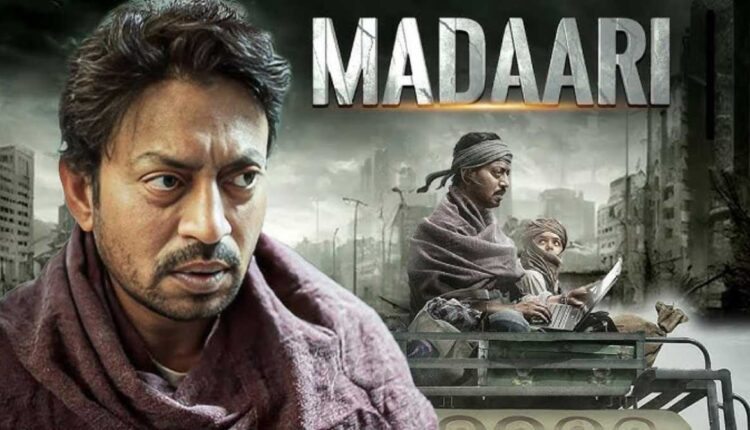Nishikant Kamat’s Madaari, which completes nine years on July 22, is not the first film that raises the burning issue of corruption by espousing vigilantism. But Madaari moves you to tears. I had to watch it twice on two successive days to absorb the immensity of Nishikant Kamat’s treatise that – and I quote from the film’s stunning climax — corruption is not part of our political system, our political system exists for corruption.
There. It’s out in the open. The terrible, frightening truism that has manoeuvered apna mahaan Bharat into a mahaan mess. With brilliant impunity Madaari builds a case for self-justice when all systems collapse and you’ve nowhere to go but to your conscience to escape the feeling of complete annihilation. One such bereft, inconsolable soul is Nirmal Kumar who has lost his son to corruption.
Somewhere in the middle of the saga of this one man’s plea for justice, we see Nirmal in an emptied-out hospital corridor grieving for his suddenly-dead son. Irrfan makes this moment so effortlessly intense, so brimming with a fluent angst… we are not watching a brilliant actor at work. We are not even watching a father mourn for son’s demise. No. We sit there watching Irrfan lament for every person who has lost out to an irreversibly corrupt political system.
On the surface Madaari is just a slick cat-and-mouse chase-saga about a vigilante and a cop (Jimmy Sheirgil, as usual effortless). But scratch the surface. What we get are some of the most thought-provoking dialogues on the rot in present-day politicking heard since Javed Akhtar penned a pained political parable in Main Azaad Hoon.
Yes, the political system has failed us. So what are we doing about it? Madaari doesn’t have a solution to the monstrous imbroglio that shrouds the Common Man’s hopes, dreams and aspirations. But it does tell us that simply sitting around waiting for a miracle to change the political system won’t happen. The cleansing process is wonderfully executed in Madaari. Director Kamat’s film is not only provocative and evocative, it’s also very cleverly put together. The editing (by Aarif Shaikh) creates a special affinity between the wounds of time and the processes of everyday existence which cruelly wash away the tears of the wounded.
By adopting a brisk attitude to the bereavement Madaari tells us we can’t sit and grieve indefinitely for our losses. We have to seek redress on our own. This is the subliminal thesis that thunders across the gracefully paced film which never sacrifices its sensitivities to appear to be a stylish thriller.
Stylish and thrilling, Madaari certainly is. Cinematographer Avinash Arun films the two sets of characters — the aggrieved and the aggressors — using almost antithetical colour palates and moods. As Irrfan and the little boy move across various differing locations, we see the changes in the topography almost as signs of the growing relationship between the host and the hostage.
It is easy to miss the film’s deep-seated passion to extract powerful emotions from situations that have been milked to maudlin death in our cinema. Overcoming its clichéd karma Madaari still moves us, sometimes to tears. The bonding which grows between the kidnapper and the little boy is played out with a heartwarming blend of paternal emotions and a convivial kinship. The little boy Vishesh Bansal who plays the kidnap victim brings much wisdom and understanding to his part, so much so that when he tells his kidnapper at the end that he knows what the bereaved father was trying to do, we see that look of enlightenment in the boy’s eyes.
As for Irrfan, what can one say about an actor who forgets to act? So real, palpable and urgent is the father’s grief that we are no more looking at a brilliant and skilful actor at work but a father mourning for the loss of innocence.
At the end we see Nirmal Kumar standing in a seashore washing his son’s memories. We hope that the message which he brings to us remains with us.
Yes, the politicians come across as caricatures. But aren’t they often just that in real life too? Madaari is a film that must be shown in every educational institute in India. It doesn’t offer a formula to eradicate corruption in politics. But it does tell us why we need to fight back before it’s too late.
Irrfan spoke to Subhash K Jha about his powerful role in Madaari. “I don’t play a vigilante in Madaari. I play a man who feels the system has collapsed completely and there is a need for a reform. My character is not based on any one individual. Nor is the film an attack on any one political ideology. It’s a very powerful subject in the thriller genre. But the drama and human emotions are not drowned in the thriller element. While the narrative remains true to the genre, the human emotions get a lot of play in the script. This is what I like about this script.”
The film is about a father who loses his child. Being a father of two sons, did Irrfan dig into his own emotional reservoir to play the grieving father in Madaari? “Never! I never do that. Because if as an actor you begin to delve deep into your own personal emotions and experiences it can get very dangerous for you. I never draw connections between my own life and the characters I play. I leave my characters on the sets when I return home.”
Not many know this. But Madaari is Irrfan’s third film with director Nishikant Kamat. “Everyone knows we did Mumbai Meri Jaan together. And now there is Madaari. But before that he shot the pilot of a television serial many years ago with me. So we go back a long way. We are both focused on our work to the exclusion of everything else.”

